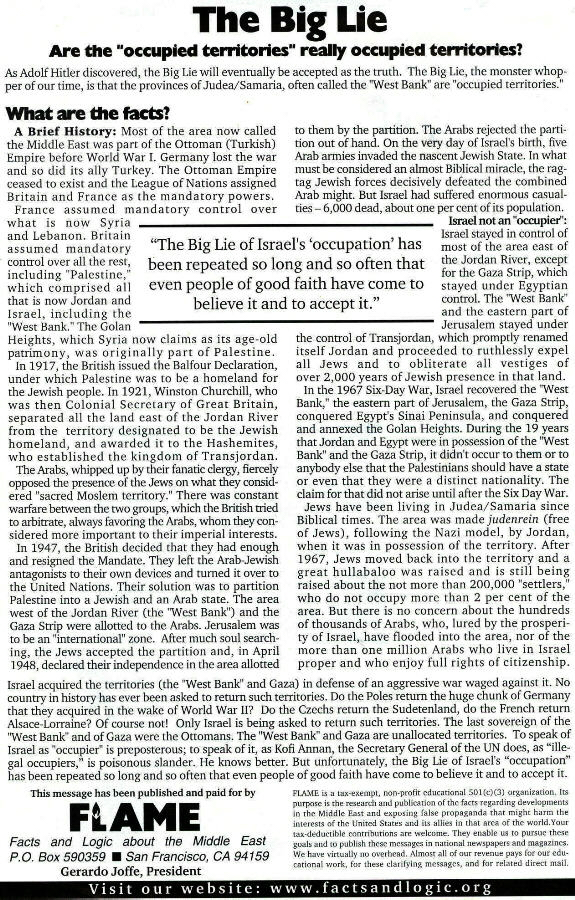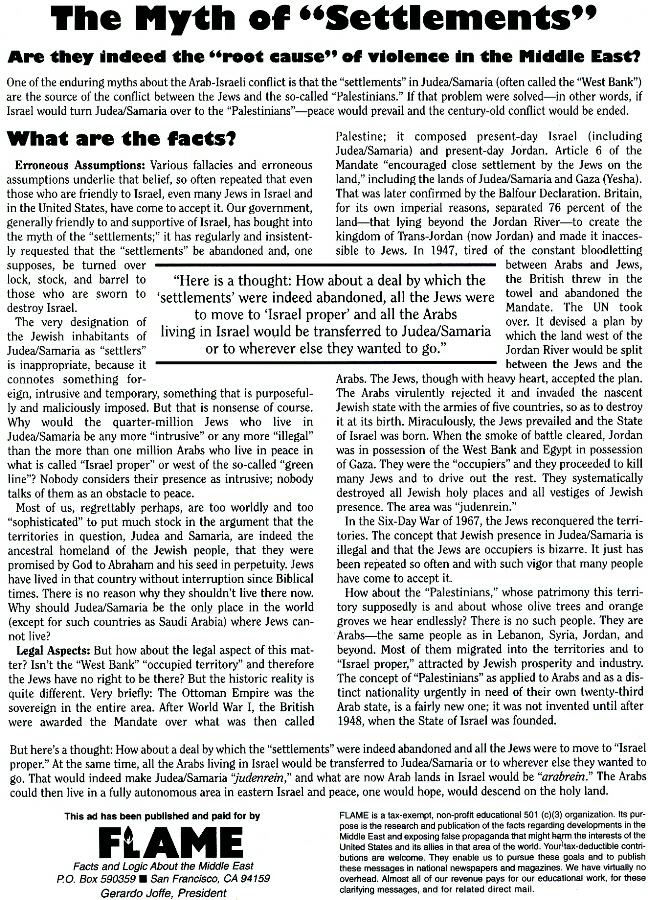|
The following excerpts were taken from:
The Wall Street Journal
Thursday, March 14, 2002
In your Feb. 28 article "Saudi Leader Pushes His Peace Plan," one sentence demands rebuttal, the one about the disputed territories referred to variously
as either "Judea and Samaria" or "Occupied West Bank." It reads: ". . . right wing politicians . . . believe Israel has a historic claim to the lands." This
implies that only Israel's right-wing politicians think Israel has a right to be in those territories, as if no other Israeli, and/or no one outside Israel, might
share that view.
Let's set the record straight, once and for all: There is no debate, in Israel or in a single country with a Western legal system, as to Israel's legal and
historical claim to the Land of Israel -- at least between the Jordan river and the Mediterranean Sea. What disagreement there is, involves if and when
and how to pursue or waive this right.
This claim, though of course influenced by biblical history and religious traditions, is fully based on legal and historical facts -- facts, not opinions or
declarations. The last legal sovereign in the area was Britain, given a mandate over the land (including what is now Jordan) by the League of Nations.
That mandate, and Britain's Balfour Declaration, followed by the U.N. and all Western states' acceptance of the establishment of the state of Israel, is
the foundation of Israel's "claim" to the land.
Judea and Samaria, the "occupied west bank of the Jordan river," has had no legal sovereign accepted by the U.N. or Western nations since 1947. Israel
has at least as powerful a claim, if not stronger, than any "Palestinian" community, which did not exist as a separate "nation" until, if then, the founding of
the PLO in 1964. There never has been a country called "Palestine," just an area in the eastern Mediterranean re-named by the Romans to attempt to
erase the Jewish people's connection with the land after the Jewish revolt in 125 A.D., and governed by a succession of rulers until the founding of
Israel. In fact, Britain's arbitrary carving "Trans-Jordan" out of Mandatory Palestine (70% of it) more than fulfills the "Arab state" called for by the U.N.
in 1947.
Furthermore, Israel's capture of the territories in 1967 occurred during a war of defense, and its right to remain in those territories until peace is brokered
is enshrined in the U.N. charter. Moreover, U.N. Resolution 242 specifically refers to Israel's withdrawal from "territories" following a peace agreement
-- not unilaterally -- and the definitive "the" describing "territories" was rejected by the framers of that resolution precisely as it was understood that Israel
was not to be forced to retreat from strategically vital defensive positions following unprovoked attacks.
What disagreement does exist, across the Western world and in Israel too, regards just what risks are worth taking in allowing Israel's rightful claim to be
waived in favor of the establishment of a national home for the Palestinian people. Here, opinions do count. Israel's left and much of the Western world
believe (or used to) that to give up the territories in return for even a cold "peace" is worth trying. Israel's right and center, and now more Western
thinkers, hold that until attitudes change in the Arab world, until the Arabs and specifically the Palestinians accept Israel's existence as legitimate -- and
truly pursue peace as an end in itself (rather than a means to weaken and destroy Israel) -- the risk to Israel, and as we've seen recently her individual
citizens, is far too great.
|



